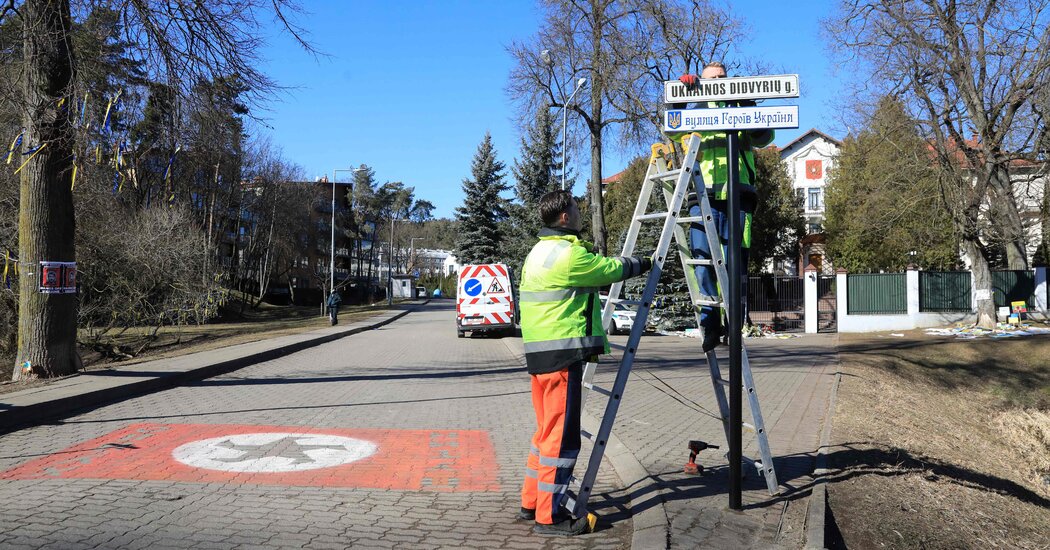Officials in many European cities are giving streets, squares and intersections in front of Russian missions names with pro-Ukraine themes.
The unassuming intersection in front of the Russian Embassy in central Oslo didn’t really have a name until Tuesday, when its local council bestowed on it a particularly pointed one: “Ukrainas Plass,” or Ukraine’s Square.
“We wanted to make a statement that we find Russia’s actions totally unacceptable,” said Tore Walaker, a councilor for Frogner, the neighborhood where the embassy is, which has been the scene of spirited protests since the Russian invasion.
Russian embassy staff will soon have to pass a sign identifying the area as Ukraine’s Square on their way to work, said Jens Jorgen Lie, the chairman of the Frogner borough council.
“It’s not helping to stop the war,” he said. “But we do the little we can and must.”
As Russian embassies have become a focus for protests in Europe and around the world against President Vladimir V. Putin, officials in some European cities are expressing their outrage at the invasion of Ukraine by trying to change street names.
In the Lithuanian capital, Vilnius, an unnamed street leading to the Russian Embassy was officially named “Ukrainian Heroes Street” on Wednesday, according to the city’s mayor, Remigijus Simasius, who added that mail might not be delivered to the embassy if it did not use the new address. “Everyone who writes a letter to the embassy will have to think about the victims of Russian aggression and the heroes of Ukraine,” he said in a post on Facebook.
Tirana, the Albanian capital, said it would name a street segment that is home to the Russian Embassy “Free Ukraine.” In Latvia, the Russian Embassy in Riga will now lie on “Ukraine Independence Street,” according to a local deputy mayor. And in Copenhagen, city officials will next week discuss changing the name of the street on which the Russian Embassy sits from “Kristianiagade” to “Ukrainegade.”
In England, lawmakers have lobbied for the street address of the Russian Embassy in London to be switched to “Zelensky Avenue,” after the Ukrainian president, Volodymyr Zelensky, who vowed in an address to Britain’s House of Commons this week that he would never surrender to Russian forces. “Britain must shame Putin at every possible opportunity,” said Layla Moran, a spokeswoman on foreign affairs for the Liberal Democrats.
The borough of Kensington and Chelsea, an affluent area that contains the Russian, Ukrainian and other embassies, said it supported the Ukrainian community, but had not yet received any official applications to change the name of the street.
“We share the world’s anger at Putin’s assault on Ukraine and are horrified at the plight of the men, women and children caught up in the conflict,” the borough said in a statement, but added: “It is actions rather than symbolism that they desperately need now.”
The proposals for name changes have been met with largely positive reactions from supporters of Ukraine, though some question the effectiveness of such symbolic moves. Others have said the renaming of streets should be even more extensive.
In Oslo, Eugenia Khoroltseva, an activist with family in Ukraine and Russia who has demonstrated near what is now Ukraine’s Square since the invasion began, said of the renaming: “I fully support it on behalf of the pro-democratic Russian community living in Norway.”
In a statement on Wednesday, the Russian Embassy in Oslo said the move would be “regarded as an anti-Russian action, whether by the government or the district authorities. Norwegians should consider this.”
Russia-Ukraine War: Key Things to Know
On the ground. As the war in Ukraine enters its third week, the Russian advance appears to have slowed. At the same time, destruction across Ukraine is growing, as Russia increases its targeting of residential areas and civilian infrastructure with long-range missiles.
In Copenhagen, the Russian Embassy noted that its street — Kristianiagade — carried the former name of Norway’s capital, a symbol of “historical bonds and good relationships between Denmark and Norway.”
“I think the Norwegians will understand,” said Jakob Ellemann-Jensen, a Danish lawmaker who is leading the proposal for renaming the street Ukrainegade. “I think there are many things we should do to help the Ukrainians. There is no action that is too small.”
The inspiration, he added, came from the naming of a plaza in front the Russian Embassy in Washington after Boris Nemtsov, the Russian opposition leader and outspoken critic of Mr. Putin who was assassinated in 2015. A similar proposal to rename a square outside a Russian consulate was made by a politician last year in the town of Kirkenes, close to the Norwegian-Russian border, but was met with resistance.
“This is a war we will never forget and a war that the Russians should never forget,” Mr. Ellemann-Jensen said.
Isabella Kwai reported from London, Henrik Pryser Libell from Oslo and Christina Anderson from Stockholm.


























